|
|
|
Sort Order |
|
|
|
Items / Page
|
|
|
|
|
|
|
| Srl | Item |
| 1 |
ID:
100467
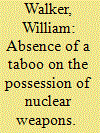

|
|
|
| 2 |
ID:
003000
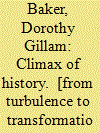

|
|
|
|
|
| Publication |
Hawthorne, Ray Leonardo and Sons., 1987.
|
| Description |
ii, 54p.Pbk
|
|
|
|
|
|
|
|
|
|
|
|
Copies: C:1/I:0,R:0,Q:0
Circulation
| Accession# | Call# | Current Location | Status | Policy | Location |
| 034662 | 940/BAK 034662 | Main | On Shelf | General | |
|
|
|
|
| 3 |
ID:
050338
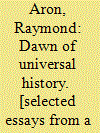

|
|
|
|
|
| Publication |
New York, Basic Books, 2002.
|
| Description |
xxvi, 518p.Hbk
|
| Standard Number |
0465004075
|
|
|
|
|
|
|
|
|
|
|
|
Copies: C:1/I:0,R:0,Q:0
Circulation
| Accession# | Call# | Current Location | Status | Policy | Location |
| 047489 | 909.82/ARO 047489 | Main | On Shelf | General | |
|
|
|
|
| 4 |
ID:
028852
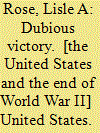

|
|
|
|
|
| Publication |
United States, The Kant State University Press., 1973.
|
| Description |
xiv, 392p.hbk
|
| Series |
Coming of the American Age , 1945-1946
|
| Contents |
Vol. I
|
| Standard Number |
087338136X
|
|
|
|
|
|
|
|
|
|
|
|
Copies: C:1/I:0,R:0,Q:0
Circulation
| Accession# | Call# | Current Location | Status | Policy | Location |
| 013548 | 973.91/ROS 013548 | Main | On Shelf | General | |
|
|
|
|
| 5 |
ID:
094272
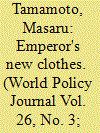

|
|
|
| 6 |
ID:
133472
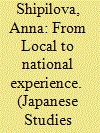

|
|
|
|
|
| Publication |
2014.
|
| Summary/Abstract |
Within Japan, the atomic bombing of Hiroshima is understood as a national experience that sets the country apart from nations that have been spared such devastation. A special phrase the Japanese use to describe their country is yuitsu hibaku kokka, 'the only country that has experienced atomic bombing'. This phrase has become a powerful cliché for depicting Japan to a national and international audience. Even though Hiroshima was the experience of a comparatively small group before it spread to a larger collectivity, its transformation into a collective experience is regarded as a natural outcome, explained by the devastating nature of the event. This perspective, however, does not fully explain why people who have different war experiences unconditionally accept as their own experiences ones which they have not personally suffered. This article aims to clarify the process by which the Hiroshima experience was nationalised, and the period of its nationalisation. It also examines whether this transformation means that Hiroshima has become a 'trauma for everybody'. This is achieved through the application of Jeffrey C. Alexander's work on the transformation of Holocaust memories into a collective trauma.
|
|
|
|
|
|
|
|
|
|
|
|
|
|
|
|
| 7 |
ID:
167210
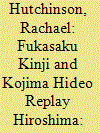

|
|
|
|
|
| Summary/Abstract |
This essay examines how photography and news footage of the Hiroshima bomb have been used as a backdrop for the action genre in Japanese film and videogames. The case studies are Fukasaku Kinji’s film Battles without Honor or Humanity (1973), and Kojima Hideo’s videogame Metal Gear Solid (1998). Fukasaku’s opening sequence employs photographic stills of the mushroom cloud, burnt-out ruins, and the black market to set the violence of yakuza gangs against the political-military violence of the United States. A generation later, Kojima's game used photographic stills of the atomic bombing in a strikingly similar way, including footage of nuclear waste facilities and weapons manufacturing. Both texts position Japan as a victim, with Hiroshima symbolizing America’s abuse of technology and power. Although both texts belong to the action genre, there is a major difference in the subjectivity of the main characters, stemming from the different narrative trajectories of each text and the media specificity of cinema and games. Agency in Kojima's text allows the player to negotiate and reshape the historical memory of Hiroshima in their own experience, performing the anti-nuclear critique through in-game actions. Combining meaningful play with digital history, videogames are highly effective vehicles for political and social critique.
|
|
|
|
|
|
|
|
|
|
|
|
|
|
|
|
| 8 |
ID:
088368
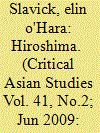

|
|
|
|
|
| Publication |
2009.
|
| Summary/Abstract |
The photographic images of Hiroshima, Japan, in this photo essay are attempts to visually, poetically, and historically address the magnitude of what disappeared as a result of and what remains after the dropping of the A-bomb in 1945. They are images of loss and survival, fragments and lives, architecture and skin, surfaces and invisible things, like radiation. Exposure is at the core of the author's photographic project: exposure to radiation, to the sun, to light, to history, and exposures made from radiation, the sun, light and historical artifacts from the Peace Memorial Museum's collection. Hiroshima: After Aftermath engages ethical seeing, visually registers warfare, and addresses the irreconcilable paradox of making visible the most barbaric as witness, artist, and viewer.
|
|
|
|
|
|
|
|
|
|
|
|
|
|
|
|
| 9 |
ID:
031454
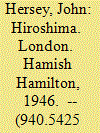

|
|
|
|
|
| Publication |
London, Hamish Hamilton, 1946.
|
| Description |
95p.Hbk
|
|
|
|
|
|
|
|
|
|
|
|
Copies: C:1/I:0,R:0,Q:0
Circulation
| Accession# | Call# | Current Location | Status | Policy | Location |
| 003949 | 940.5425/HER 003949 | Main | On Shelf | General | |
|
|
|
|
| 10 |
ID:
173030
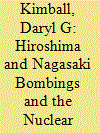

|
|
|
|
|
| Summary/Abstract |
The U.S. atomic bomb attack on the people of Hiroshima at 8:15 a.m. on August 6, 1945, and the second attack on the city of Nagasaki at 11:02 a.m. on August 9 killed and wounded hundreds of thousands of unsuspecting men, women, and children in a horrible blast of fire and radiation, followed by deadly fallout. In years that followed, those who survived—the hibakusha—suffered from the trauma of the experience and from the long-term effects of their exposure to radiation from the weapons.
|
|
|
|
|
|
|
|
|
|
|
|
|
|
|
|
| 11 |
ID:
142982
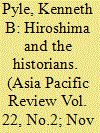

|
|
|
|
|
| Summary/Abstract |
As is clear from the historiography of the US decision to use the atomic bomb on Hiroshima, the judgments of historians are relative to the time, place, and perspective from which they are writing. There are four major schools of historical interpretation of the decision. First is the orthodox view that was offered by the participants in the decision. Second is the revisionist view of historians writing during the era of the Vietnam war who adopted a much more critical interpretation. Third is an interpretive school that gives weight to the Japanese role and responsibility. Finally, the author's view is found in a more long-range perspective that finds the momentum created by President Roosevelt's unconditional surrender policy as the decisive factor. This policy provoked unconditional resistance in the Japanese military. By 1945 the legacy of Roosevelt's policy was firmly embedded in American public opinion. Historians have reached no consensus among these different interpretive schools.
|
|
|
|
|
|
|
|
|
|
|
|
|
|
|
|
| 12 |
ID:
026559
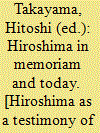

|
|
|
|
|
|
|
|
|
|
|
|
|
|
|
|
|
Copies: C:1/I:0,R:0,Q:0
Circulation
| Accession# | Call# | Current Location | Status | Policy | Location |
| 015628 | 355.0217/TAK 015628 | Main | On Shelf | General | |
|
|
|
|
| 13 |
ID:
147096
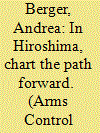

|
|
|
| 14 |
ID:
038763
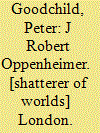

|
|
|
|
|
| Publication |
London, British Broadcasting Corporation, 1980.
|
| Description |
301p.Hbk
|
| Standard Number |
0563177810
|
|
|
|
|
|
|
|
|
|
|
|
Copies: C:1/I:0,R:0,Q:0
Circulation
| Accession# | Call# | Current Location | Status | Policy | Location |
| 026120 | 925.397/GOO 026120 | Main | On Shelf | General | |
|
|
|
|
| 15 |
ID:
127540
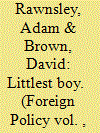

|
|
|
| 16 |
ID:
128687
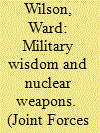

|
|
|
| 17 |
ID:
127544
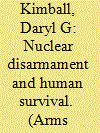

|
|
|
| 18 |
ID:
146723
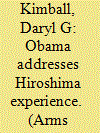

|
|
|
| 19 |
ID:
004670
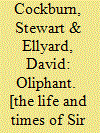

|
|
|
|
|
| Publication |
Adelaide, Axiom Books, 1981.
|
| Description |
xviii, 369p.: ill.Hbk
|
| Standard Number |
0959416404
|
|
|
|
|
|
|
|
|
|
|
|
Copies: C:1/I:0,R:0,Q:0
Circulation
| Accession# | Call# | Current Location | Status | Policy | Location |
| 035636 | 925/COC 035636 | Main | On Shelf | General | |
|
|
|
|
| 20 |
ID:
122403
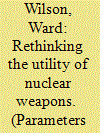

|
|
|
|
|
| Publication |
2012-13.
|
| Summary/Abstract |
The parameters of the discussion about nuclear weapons are well
known and appear to be relatively fixed. It seems as if there has
been little new on that front in forty years. Most civilian scholars
have lost interest in nuclear weapons and moved on to other topics. But
it is the habit of the military mind to learn from the past; even today
there are lessons to be learned from Cannae, Waterloo, and Vicksburg.
It will not surprise thoughtful military officers to find that the past has
something important and interesting to tell us about nuclear weapons.
|
|
|
|
|
|
|
|
|
|
|
|
|
|
|
|
|
|
|
|
|